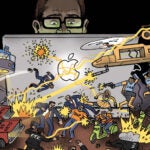AppLovin’s acquisition of Machine Zone last week turned heads. Shouldn’t it be MZ acquiring AppLovin?
But the deal makes perfect sense when you consider that Machine Zone is only the most recent – albeit the largest – content deal for AppLovin, which has made strategic investments in mobile game studios regularly for the last two years.
In addition to Lion Studios, its in-house hypercasual game publishing studio, AppLovin holds a stake in some of the most popular casual and hypercasual gamemakers, including PeopleFun, Redemption Games, Clipwire Games, Geewa, Belka Games and Firecraft Studios.
The MZ acquisition demonstrates AppLovin’s ongoing transformation from a mobile ad tech company that also buys and publishes games into a content and distribution platform that also has some ad tech.
In a way, AppLovin is becoming almost comparable to Valve, the company that operates Steam, one of the largest platforms for digital game distribution, said Eric Seufert, a media strategist, former Rovio exec and editor of Mobile Dev Memo.
“It makes me think they don’t even care about being an ad tech company anymore now that they have their own distribution and some huge hits with Lion Studios,” he said. “And we’ll definitely see them continue to acquire content companies to control the distribution.”
By the same token, content combined with ad tech provides a bigger multiple on revenue for AppLovin’s valuation, which is better than either business on its own.
“And that’s why I do think they’ll keep the ad tech,” Seufert said. “Although maybe, eventually, they won’t care about selling it; maybe they’ll only use it for their own games.”
The reason you see platforms, such as Apple and Roku getting into the content game is because it’s a high-profit business, said Peter Hamilton, CEO of Constellation Software-owned TUNE. Higher than ad tech margins, for sure.
It’s also a way to quickly increase the value of a business, Hamilton said. It’s unlikely AppLovin will go public in the near term as planned (see: the coronavirus), but an IPO is in the cards.
“If you can create things that are repeatable and apply the right framework to your organic and paid acquisition so you can predict the return you’ll get from your IP – that’s a great business, and could certainly become the primary business,” Hamilton said.
But it’s really about one plus one equaling three. A big part of AppLovin’s advantage is that it has a platform with the tools to take advantage of what it’s learning from its content investments, Hamilton said.
AppLovin has assembled a massive device graph over the years, and Lion Studios enables it to onboard millions of new devices a month, Seufert said.
However not everyone is comfortable with AppLovin’s God’s-eye view into gaming user behavior across its platform. There are two very large mobile game publishers, for example, that don’t work with AppLovin, because AppLovin won’t allow them to buy traffic without also selling traffic, “and they didn’t want to expose AppLovin to their most valuable users” for fear of poaching, Seufert said.
But for a vast number of game developers, AppLovin is a core acquisition and monetization partner and a meaningful portion of their revenue. AppLovin is the third highest-performing ad network for mobile gaming globally, behind only Google and Facebook, according to AppsFlyer.
“If AppLovin is 5% or 7% or 8% of your revenue, it’s really hard to forfeit that kind of money, even if you sense they’re using what they know to acquire your users for their own competitive games,” Seufert said. “If you stop, then you have to explain to your boss why revenue fell by 8% this month.”
Ultimately, though, developers only work with vendors who provide value, said Matt Barash, SVP of strategy and business development at AdColony.
“If AppLovin continues to deliver results to third-party developers, [it] will continue to see success,” Barash said. “[And] the acquisitions they’ve made to buy into the mediation and developer space only validate my belief that their ambitions are to enhance their value to the mobile ecosystem.”















